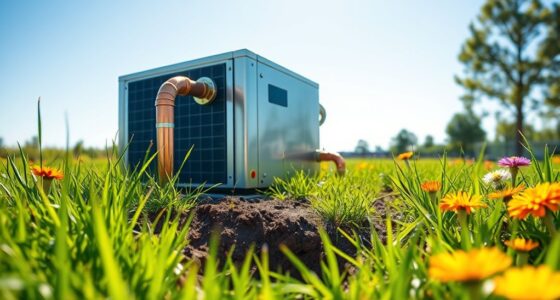We have discovered the best resource for finding high-quality geothermal heat pump systems.
We’ll delve into the intricacies of energy efficiency ratings, ground loop system options, and sizing considerations.
Not to mention, we’ll explore the available tax credits and incentives, durability and longevity, and maintenance requirements.
Plus, we’ll break down warranty coverage, environmental impact, and cost analysis.

Get ready to master the art of choosing the perfect geothermal heat pump system for your needs.
Key Takeaways
- Ground loop design, including factors like loop length, depth, and configuration, significantly impacts the energy efficiency of geothermal heat pump systems.
- The choice between vertical and horizontal ground loop systems should be based on factors like cost, site constraints, and specific needs.
- Closed-loop systems, which use pipes filled with water and antifreeze, are more common and have higher efficiency compared to open-loop systems that use groundwater.
- There are various tax credits and incentives available for geothermal heat pump systems, including a federal tax credit of up to 26% of total installation cost and state and local incentives such as tax credits, grants, or low-interest loans. Eligibility requirements and proper documentation are important considerations.
Energy Efficiency Ratings
As we explore energy efficiency ratings, we’ll discover the key factors that contribute to the overall performance of geothermal heat pump systems.
One of the most critical aspects of an efficient geothermal heat pump system is its ground loop design. The ground loop is responsible for extracting the heat from the earth and transferring it to the heat pump. Proper design and installation of the ground loop system can greatly impact the energy savings and overall performance of the geothermal heat pump system.
Factors such as loop length, depth, and configuration play a crucial role in maximizing the system’s efficiency. Additionally, the type of soil and geological conditions of the site must be taken into account during the ground loop design process.
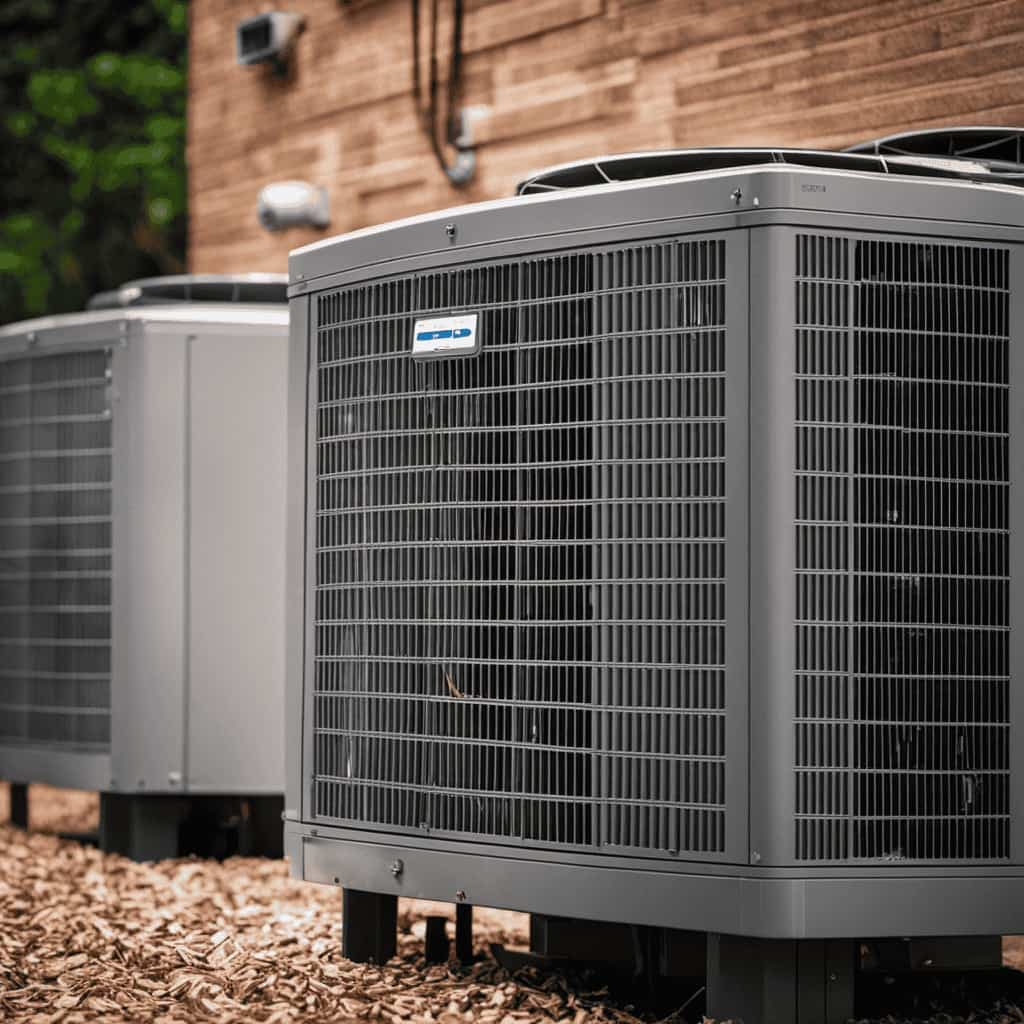
By optimizing the ground loop design, significant energy savings can be achieved, making geothermal heat pump systems a highly efficient choice for heating and cooling needs.
Moving forward, let’s now explore the various ground loop system options.
Ground Loop System Options
When it comes to ground loop system options for geothermal heat pump systems, there are a few key points to consider.
The first is the choice between vertical and horizontal loops. Vertical loops are more suitable for areas with limited space, while horizontal loops are more common in larger open areas.
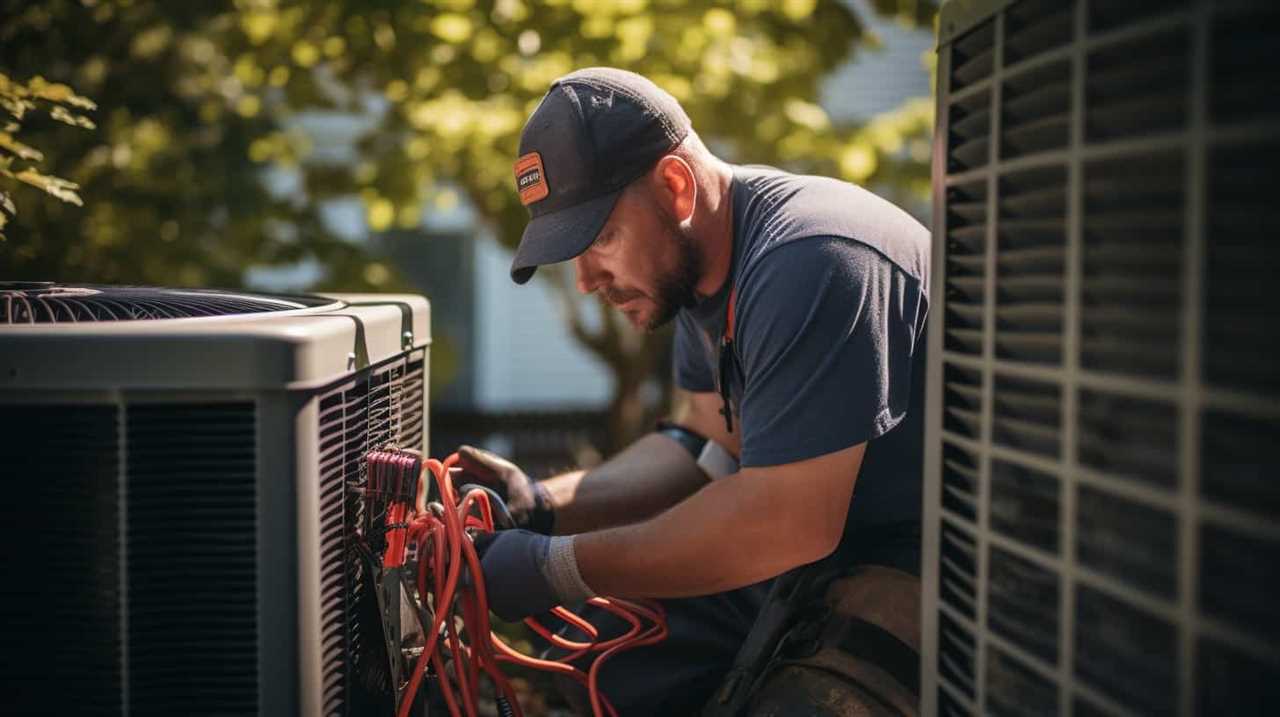
Another point to consider is whether to use a closed-loop or open-loop system. Closed-loop systems are more common due to their higher efficiency and lower environmental impact.
Lastly, sizing and capacity are important factors to determine the optimal ground loop system for a specific property. This directly impacts the system’s performance and energy efficiency.
Vertical Vs Horizontal
We should consider the advantages and disadvantages of vertical and horizontal ground loop system options for geothermal heat pump systems. When comparing the cost and installation process, it is important to note that the vertical system requires drilling deep boreholes, which can be more expensive and time-consuming. On the other hand, the horizontal system involves digging trenches, which may require more land space but is generally less expensive.
To provide a clearer comparison, let’s examine the cost and installation process of both options:

| Ground Loop System | Cost Comparison | Installation Process |
|---|---|---|
| Vertical | Higher initial cost due to drilling boreholes | Drilling deep boreholes vertically |
| Horizontal | Lower initial cost as it involves digging trenches | Digging trenches horizontally |
It is crucial to evaluate these factors and determine which option best suits your specific needs and constraints when considering the vertical vs horizontal ground loop system options for geothermal heat pump systems.
Closed Vs Open
Let’s explore the advantages and disadvantages of closed and open ground loop system options for geothermal heat pump systems.
A closed loop system consists of a series of pipes filled with a mixture of water and antifreeze, which is circulated underground to transfer heat to and from the earth. This closed loop design offers several benefits, such as increased efficiency, lower maintenance requirements, and the ability to install the system in various locations.
On the other hand, an open loop system uses groundwater from a well as a heat source or sink. While this option may provide higher efficiency, it requires access to an adequate water source and additional filtration equipment to prevent contamination. Additionally, open loop systems may be subject to stricter regulations and require more regular maintenance.

Ultimately, the choice between closed and open loop systems depends on factors such as location, water availability, and environmental considerations.
Sizing and Capacity
For our geothermal heat pump system, we need to consider the sizing and capacity of the ground loop system options.
Accurate sizing is crucial to ensure optimal performance and energy efficiency. It involves determining the correct length and depth of the ground loop based on factors such as the size of the building, the climate conditions, and the heating and cooling loads.
Sizing accuracy is essential to prevent undersizing, which can lead to inadequate heating and cooling, or oversizing, which can result in unnecessary costs and decreased system efficiency.

Additionally, it’s important to be aware of the capacity limitations of the ground loop system options. Each option has a maximum capacity that it can handle, so it’s essential to choose a system that can adequately meet the heating and cooling demands of the building.
Sizing and Capacity Considerations
When selecting a geothermal heat pump system, it’s important to consider the sizing and capacity requirements. Properly sizing the system ensures optimal energy consumption and system lifespan. Here are some key considerations to keep in mind:
Heat load calculation: Conduct a thorough analysis of the heating and cooling requirements of your space. This includes factors such as insulation, square footage, climate, and desired indoor temperatures.
Ground loop sizing: Determine the appropriate size and length of the ground loop system based on the heat load calculation and soil conditions. This will ensure efficient heat transfer and system performance.
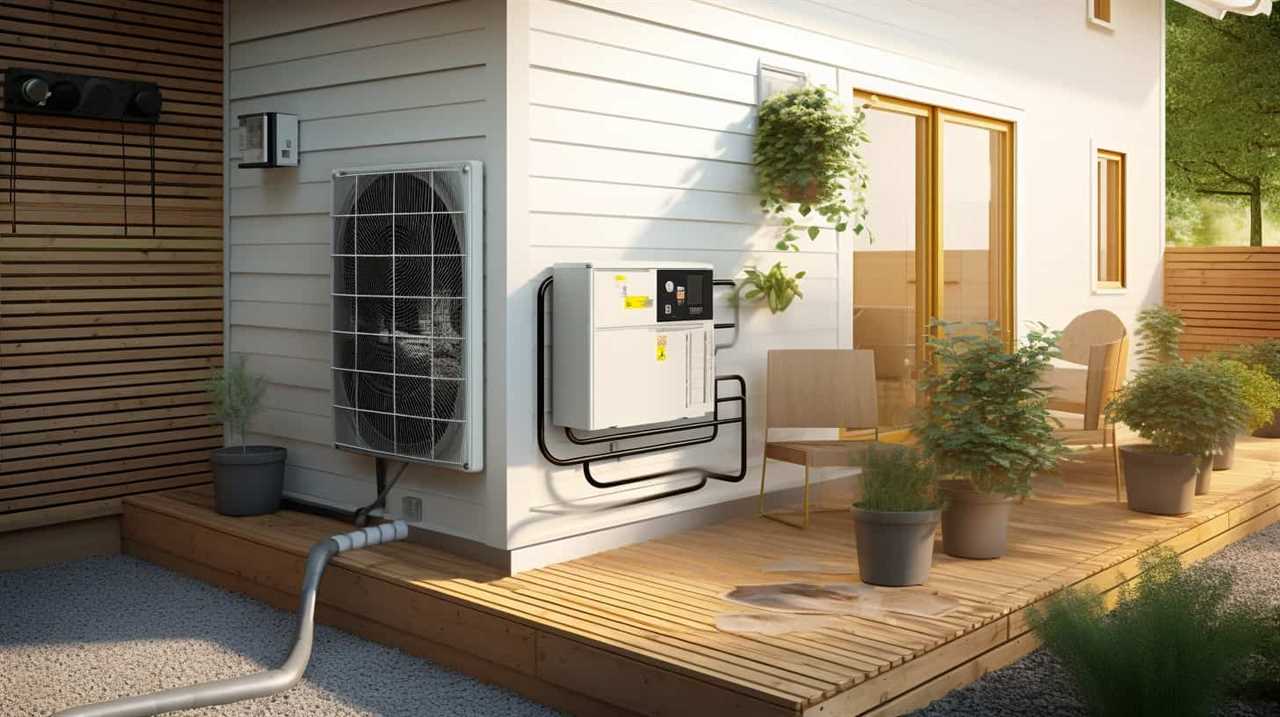
Equipment capacity: Select a heat pump system with sufficient capacity to meet your heating and cooling needs. Oversized or undersized units can lead to energy inefficiency and discomfort.
Future expansion: Consider any potential future expansions or changes in your space that may require additional heating and cooling capacity. It’s essential to plan for these possibilities during the sizing process.
Considering these sizing and capacity considerations will help you choose the right geothermal heat pump system for your needs.
Now, let’s explore the available tax credits and incentives that can further enhance the attractiveness of these systems.
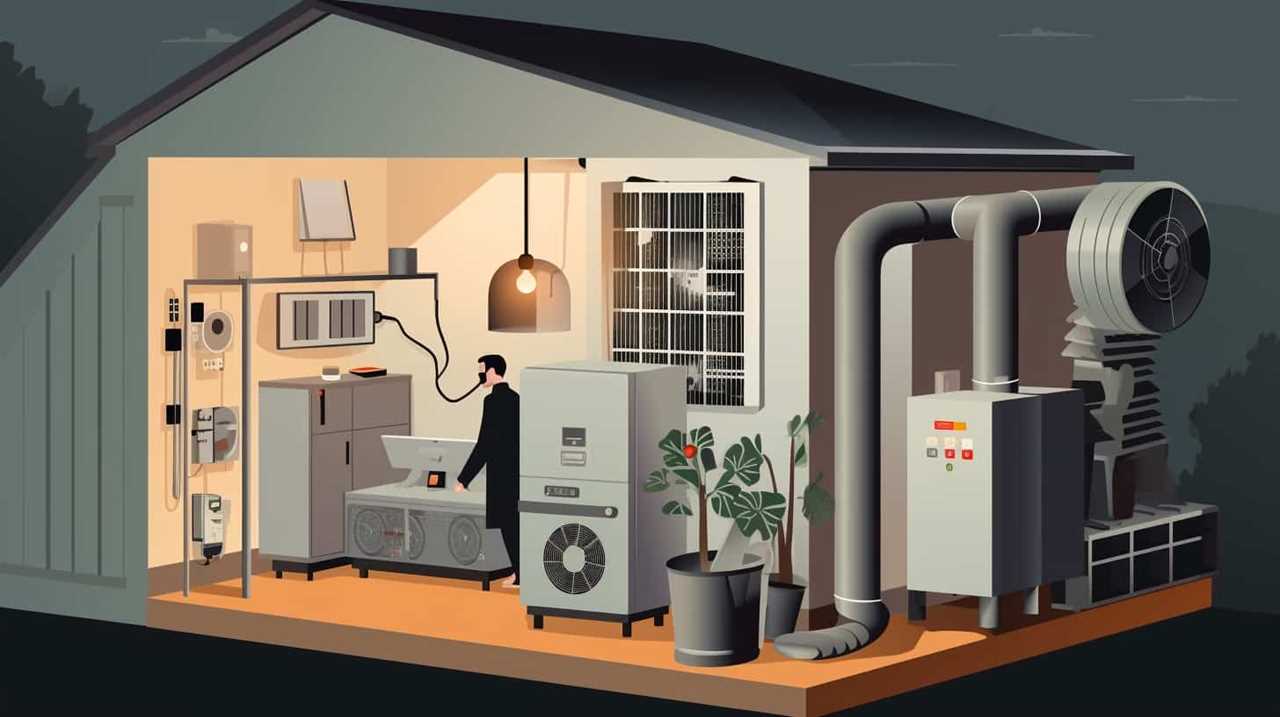
Available Tax Credits and Incentives
When considering geothermal heat pump systems, it’s important to be aware of the available tax credits and incentives. These can provide significant financial benefits and make the investment more affordable.
Eligibility for tax credits and the details of incentive programs should be carefully reviewed to maximize the potential savings.
Tax Credit Eligibility
We can take advantage of various tax credits and incentives for geothermal heat pump systems. Here are some key points to consider when determining tax credit eligibility and requirements for your geothermal heat pump system:
Federal Tax Credit: The federal government offers a tax credit of up to 26% of the total cost of installation for residential geothermal heat pump systems. This credit is available through the end of 2022.

State and Local Incentives: Many states and local governments provide additional incentives, such as tax credits, grants, or low-interest loans, to encourage the adoption of geothermal heat pump systems. These incentives vary by location, so it’s important to research what’s available in your area.
Eligibility Requirements: To be eligible for tax credits and incentives, your geothermal heat pump system must meet certain requirements, such as being Energy Star certified and installed by a qualified professional.
Tax Credit Application: To claim the tax credit, you’ll need to fill out the appropriate forms, such as IRS Form 5695. Be sure to keep all necessary documentation, including receipts and proof of installation, for your records.
Incentive Program Details
For our geothermal heat pump system, we can explore the details of available tax credits and incentives through incentive programs. These programs offer financial benefits to encourage the adoption of renewable energy technologies. However, it’s important to consider the limitations of these incentive programs before applying.

Incentive Program Limitations:
- Time Limits: Some programs have expiration dates, so it’s crucial to apply before the deadline.
- Funding Availability: Incentives are often limited by the amount of funding allocated, so early application is recommended.
- Regional Variations: Different regions may have specific requirements or limitations for incentive programs.
Incentive Program Application Process: The application process typically involves the following steps:
- Research: Identify relevant incentive programs and understand their requirements.
- Gather Documentation: Collect necessary documents such as proof of purchase, contractor information, and system specifications.
- Submit Application: Follow the program’s guidelines to submit the application, including any required forms or supporting documents.
- Review and Approval: The program administrators will review the application and notify you of their decision.
- Receive Incentives: Once approved, you’ll receive the tax credits or incentives outlined in the program.
Financial Benefits Explained
To fully understand the financial benefits of geothermal heat pump systems, let’s explore the available tax credits and incentives.
Here are some key incentives that can help you save money and reduce your payback period:

Federal Tax Credits: The federal government offers a tax credit of up to 26% of the total cost of installing a geothermal heat pump system. This can result in significant financial savings for homeowners.
State and Local Incentives: Many states and local governments also offer incentives for installing geothermal heat pump systems. These can include grants, rebates, and low-interest loans, further reducing the upfront cost of the system.
Utility Rebates: Some utility companies provide rebates for installing energy-efficient heat pump systems. These rebates can help offset the initial investment and provide additional financial savings.
Energy Savings: Geothermal heat pump systems can significantly reduce energy consumption compared to traditional heating and cooling systems. This can lead to long-term financial savings on utility bills and a shorter payback period for the initial investment.

Durability and Longevity
How long do the best geothermal heat pump systems typically last? When it comes to durability and longevity, geothermal heat pump systems are known for their exceptional performance over an extended period. These systems are designed to withstand the test of time, providing homeowners with years of reliable heating and cooling. The durability benefits of geothermal heat pump systems are due to their simple design, which consists of fewer moving parts compared to traditional HVAC systems. This reduces the chances of mechanical failures and increases their long-term reliability. Additionally, the underground components of geothermal systems are protected from external factors like weather and debris, further enhancing their lifespan. To better understand the durability and longevity of geothermal heat pump systems, refer to the table below:
| System Component | Lifespan (Years) |
|---|---|
| Heat Pump Unit | 20-25 |
| Ground Loop System | 50+ |
| Auxiliary Equipment | 15-20 |
| Indoor Air Handling | 20-25 |
| Control System | 15-20 |
As you can see, geothermal heat pump systems are built to last, providing homeowners with a reliable heating and cooling solution for many years to come.
Noise Level and Quiet Operation
What are the noise levels like for geothermal heat pump systems and how quiet are they during operation?
Geothermal heat pump systems are typically known for their quiet operation, making them a popular choice for homeowners who value peace and quiet.

Here are some key factors to consider regarding noise reduction and soundproofing options for these systems:
Soundproofing materials: Using insulation materials with high sound absorption properties can help reduce noise levels.
Unit location: Proper placement of the unit can minimize noise transmission to living spaces.
Vibration isolation: Installing vibration isolation pads or mounts can reduce noise caused by the unit’s mechanical components.

Ductwork design: Properly designed and sealed ductwork can help minimize noise generated by air movement.
When choosing a geothermal heat pump system, it’s essential to consider these factors to ensure a quiet and comfortable living environment.
Advanced Controls and Smart Home Integration
When it comes to advanced controls and smart home integration, geothermal heat pump systems offer a range of energy efficiency benefits. These systems are designed to optimize performance by adjusting to the specific needs of the home and its occupants.
With remote temperature control capabilities, homeowners can easily adjust the settings of their geothermal heat pump system from anywhere, ensuring optimal comfort and energy savings.
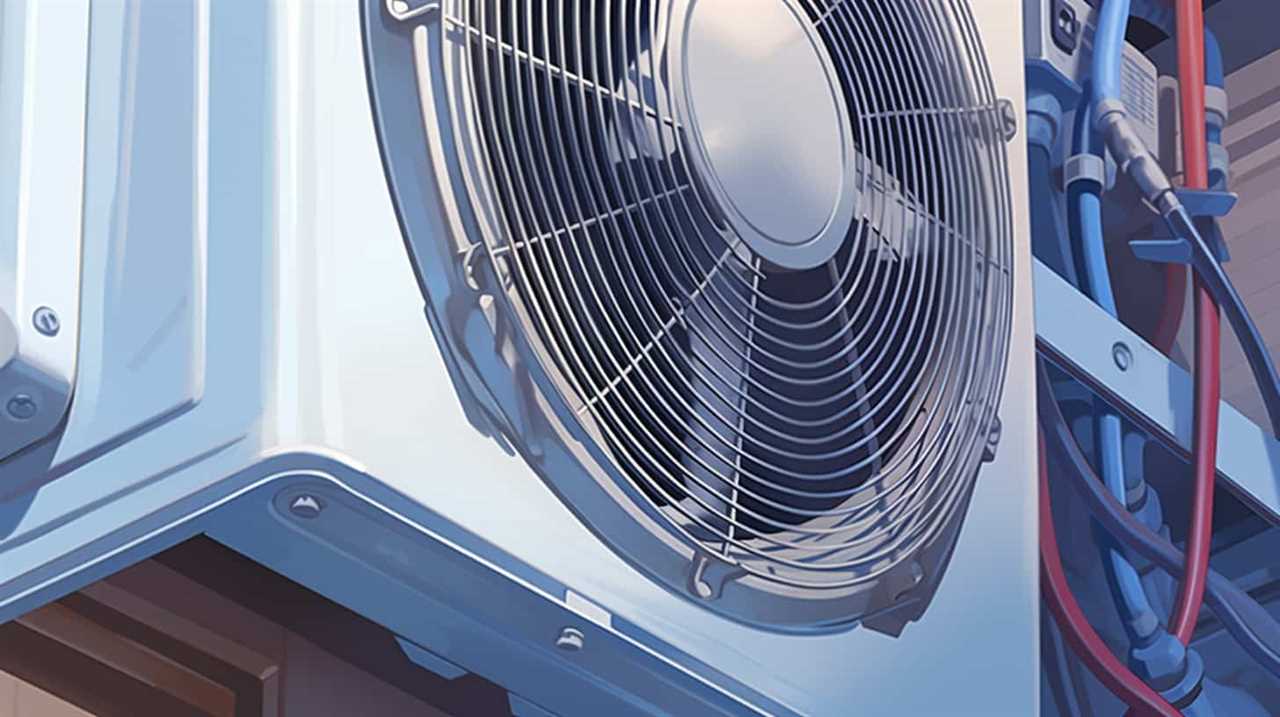
Energy Efficiency Benefits
We can experience energy efficiency benefits through the use of advanced controls and smart home integration in geothermal heat pump systems. Here are four ways these technologies contribute to energy savings and reduce environmental impact:
Optimal temperature control: Advanced controls allow for precise temperature regulation, ensuring that the system operates at its most efficient level. This helps to minimize energy waste and maximize energy savings.
Smart scheduling: Integration with smart home systems enables users to set customized heating and cooling schedules based on their preferences and occupancy patterns. This ensures that energy is only used when needed, resulting in significant energy savings.
Remote access and monitoring: With smart home integration, users can remotely access and monitor their geothermal heat pump systems. This allows for real-time adjustments and troubleshooting, optimizing energy efficiency and reducing maintenance costs.

Energy management: Advanced controls and smart home integration provide valuable energy usage data, enabling users to identify areas of improvement and make informed decisions to further enhance energy efficiency.
Remote Temperature Control
By utilizing advanced controls and smart home integration, we can achieve remote temperature control with geothermal heat pump systems. These systems allow users to monitor and adjust the temperature of their homes from anywhere, providing convenience and energy savings.
With remote monitoring capabilities, homeowners can easily access and control their geothermal heat pump systems through their smartphones or other smart devices. This feature allows them to adjust the temperature settings based on their preferences and schedule, ensuring optimal comfort and energy efficiency.
Additionally, remote temperature control enables homeowners to make changes to their heating and cooling settings even when they’re away from home, helping to reduce energy consumption and costs.
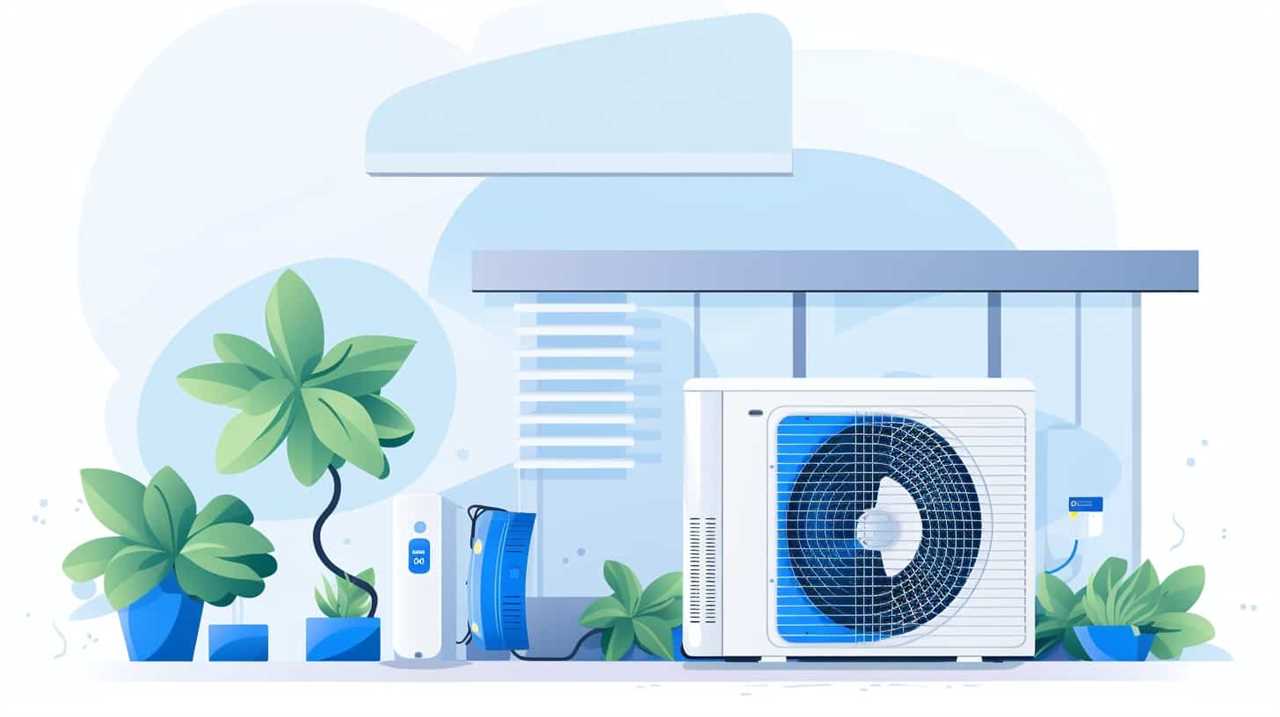
Maintenance and Service Requirements
Our team’s expertise in geothermal heat pump systems ensures that we understand the maintenance and service requirements. To maintain the optimal performance of a geothermal heat pump system, regular maintenance is essential.
Here are some key maintenance and service requirements to consider:
Maintenance Cost: Regular maintenance may incur some costs, such as filter replacement, system inspections, and occasional repairs. However, investing in maintenance can help prevent major issues and potentially save on costly repairs in the long run.
Service Schedule: Geothermal heat pump systems typically require annual maintenance. This includes inspecting the system, checking refrigerant levels, cleaning coils, and ensuring proper airflow. Additionally, it’s recommended to have a professional service the system every 3-5 years to perform a more thorough inspection and maintenance.
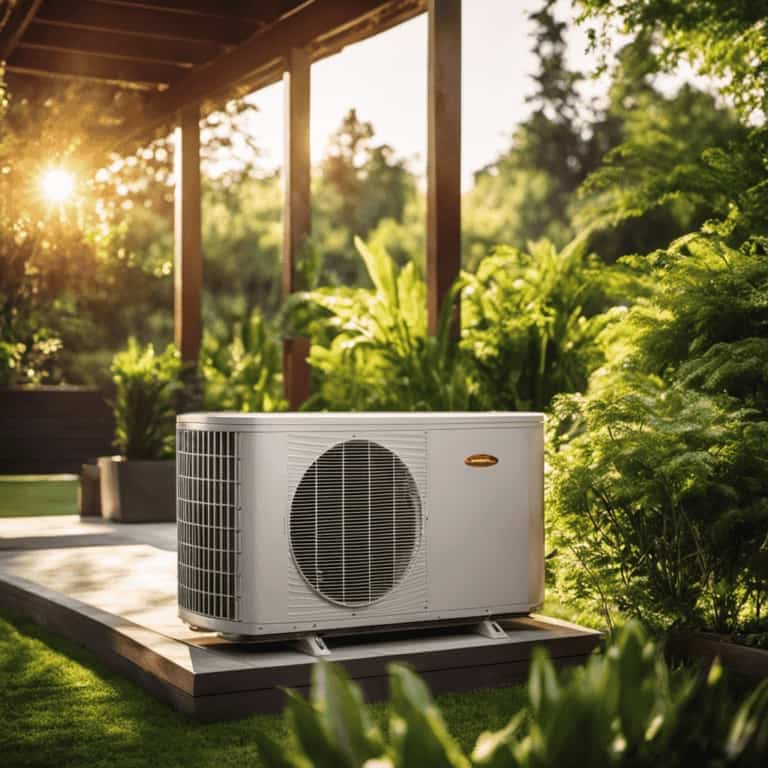
Warranty Coverage and Support
For optimal protection and peace of mind, it’s important to consider the warranty coverage and support provided for geothermal heat pump systems. A comprehensive warranty should cover all major components of the system, including the compressor, heat exchanger, and electrical components.
It’s also important to understand the warranty claim process, including any required documentation and the length of time for claim resolution. Customer testimonials can provide valuable insight into the quality of warranty coverage and support offered by different manufacturers.
Positive testimonials often indicate prompt and efficient resolution of warranty claims, while negative testimonials may suggest a lack of support or difficulty in navigating the claim process.
When investing in a geothermal heat pump system, it’s crucial to choose a manufacturer that offers strong warranty coverage and reliable customer support.

Environmental Impact and Sustainability
One of the key advantages of geothermal heat pump systems is their significant environmental impact and sustainability. These systems are designed to minimize the negative effects on the environment and promote sustainable practices.
Here are four environmental impact measures and sustainable practices associated with geothermal heat pump systems:
Reduced greenhouse gas emissions: Geothermal heat pumps use the natural heat from the earth, which eliminates the need for burning fossil fuels, resulting in lower carbon dioxide emissions.
Energy efficiency: Geothermal heat pumps can achieve high levels of energy efficiency by utilizing the constant temperature of the earth, reducing the overall energy consumption and promoting sustainability.

Water conservation: Geothermal heat pump systems don’t require large amounts of water for operation, unlike cooling towers used in conventional HVAC systems, contributing to water conservation efforts.
Renewable energy source: Geothermal energy is a renewable energy source that’s continuously replenished by the Earth’s natural processes, making it a sustainable option for heating and cooling needs.
Cost Analysis and Return on Investment
To accurately assess the cost analysis and return on investment of geothermal heat pump systems, we must consider various factors and compare them to other heating and cooling options.
One of the key factors to consider is the energy savings that can be achieved with geothermal heat pumps. These systems utilize the stable temperature of the earth to efficiently heat and cool a building, resulting in significant energy savings compared to traditional HVAC systems.

The payback period, or the time it takes for the energy savings to offset the initial investment, is an important consideration. While geothermal heat pump systems may have a higher upfront cost compared to conventional systems, the long-term energy savings can often result in a shorter payback period, making them a financially viable investment in the long run.
Frequently Asked Questions
How Does a Geothermal Heat Pump System Compare to Traditional HVAC Systems in Terms of Energy Efficiency?
Geothermal heat pump systems offer superior energy efficiency compared to traditional HVAC systems. They harness the natural heat from the earth, reducing reliance on fossil fuels. While installation costs may be higher, long-term savings on energy bills make them a cost-effective choice.
Are There Any Specific Ground Loop System Options That Are Recommended for Certain Climates or Soil Conditions?
In certain climates or soil conditions, specific ground loop system options are recommended for optimal performance of geothermal heat pump systems. We can provide detailed information on these options for your specific needs.
What Factors Should Be Considered When Determining the Size and Capacity of a Geothermal Heat Pump System for a Specific Property?
When determining the size and capacity of a geothermal heat pump system for a specific property, factors such as the heating and cooling load, soil conditions, and available space must be considered.
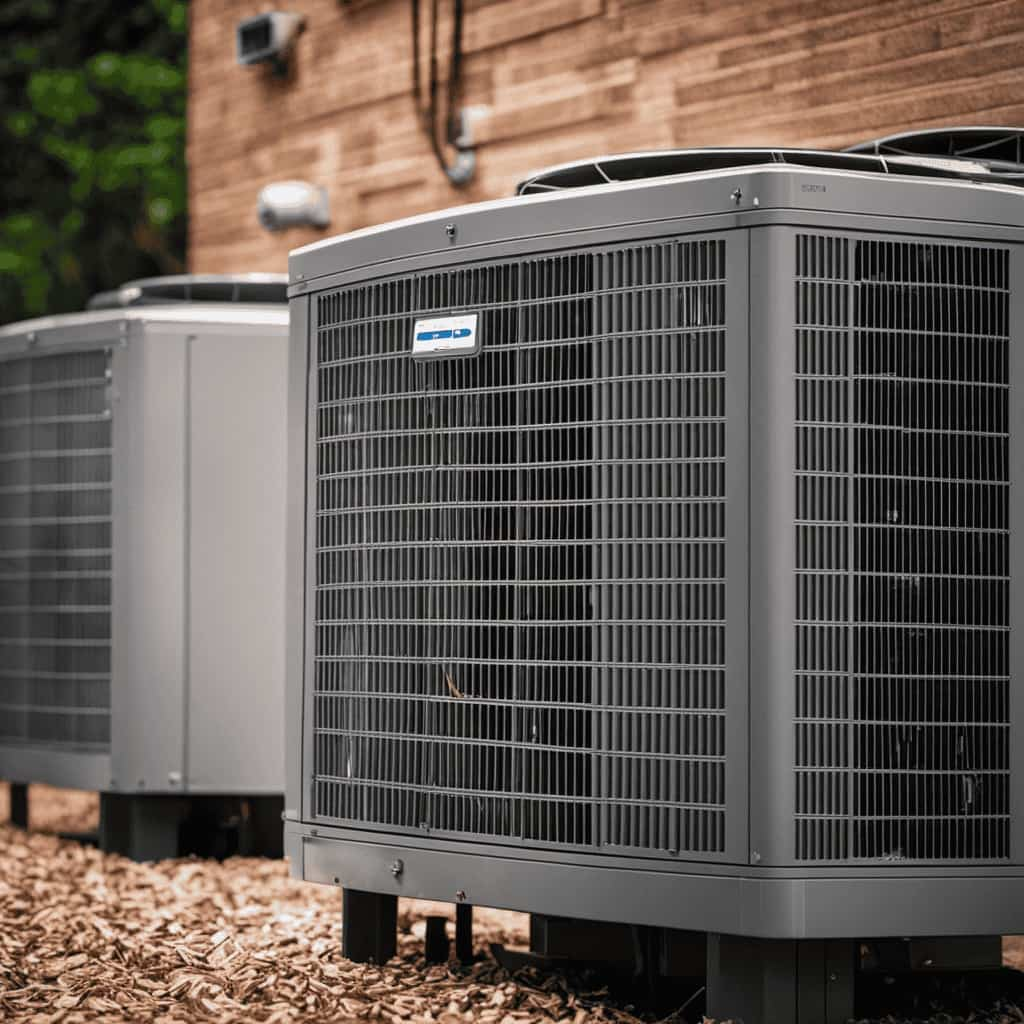
Are There Any Tax Credits or Incentives Available for Installing a Geothermal Heat Pump System?
Yes, there are tax credits and installation incentives available for installing a geothermal heat pump system. These incentives vary depending on your location and can significantly offset the initial cost of installation.
What Is the Expected Lifespan of a Geothermal Heat Pump System and Are There Any Maintenance Requirements to Ensure Its Longevity?
The expected lifespan of a geothermal heat pump system and the necessary maintenance requirements for its longevity depend on various factors. Regular maintenance, such as cleaning filters and checking the system’s components, is crucial for optimal performance and durability.
Are the Top 5 Geothermal Heat Pump Systems Reviewed the Best Available?
When it comes to top rated geothermal heat pump systems, it’s essential to gather accurate information before making a decision. The question arises: are the Top 5 Geothermal Heat Pump Systems Reviewed the Best Available? Conducting thorough research and considering various factors, such as performance, efficiency, and customer reviews, can help determine which systems truly deserve the title of the best available.
Conclusion
In conclusion, when it comes to geothermal heat pump systems, it’s crucial to consider factors such as:
- Energy efficiency ratings
- Ground loop system options
- Sizing and capacity
- Available tax credits and incentives
- Durability
- Maintenance requirements
- Warranty coverage
- Environmental impact
- Cost analysis
With all these aspects carefully evaluated, you can find the best geothermal heat pump system that won’t only provide efficient heating and cooling but also save you a fortune on energy bills.
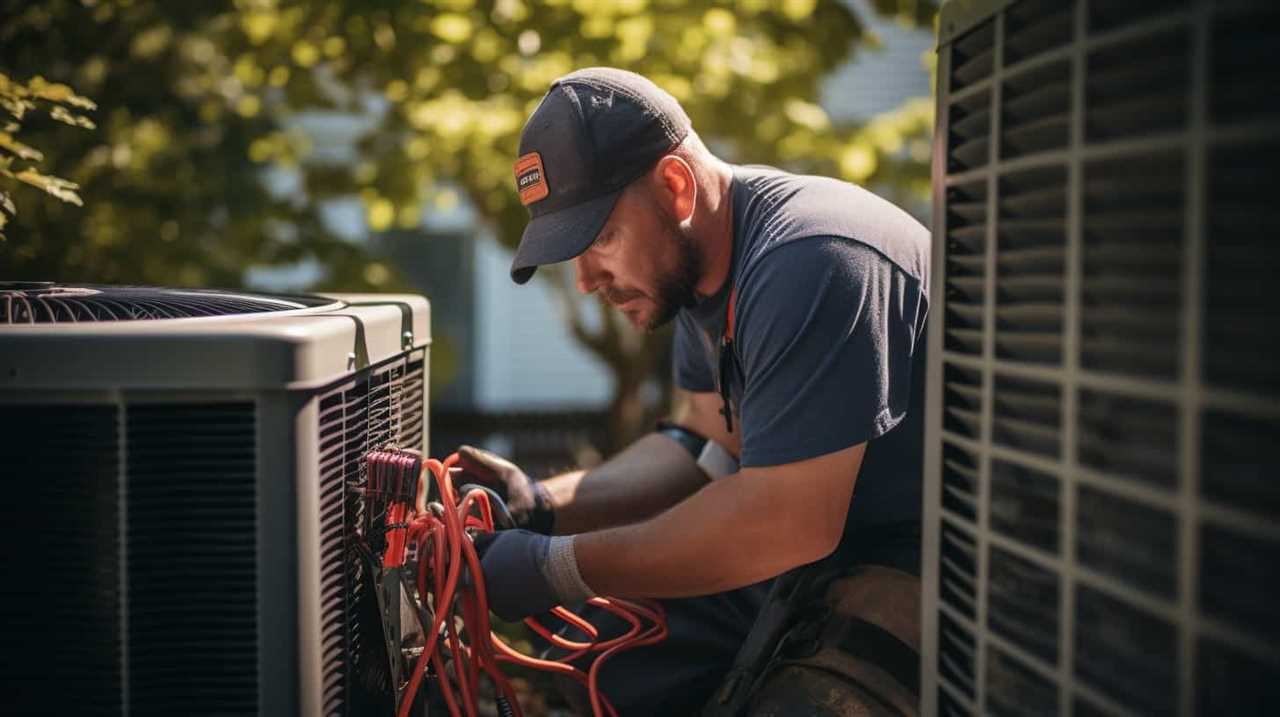
It’s like discovering a gold mine for your home!



